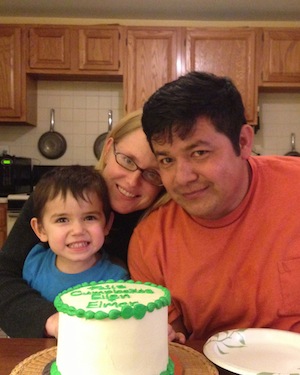
“Uncle, help me!” Adán cried. “Where are you?” Miguel called back. Fourteen-year-old Adán had enclosed himself into a bedroom closet to escape the flames, smoke, and falling beams in his room, where faulty electrical wiring had started the midnight blaze. Miguel kicked down the bedroom door and dragged Adán from the closet into the living room and out of the house. The rest of the family at home awoke: Adán’s younger siblings Maribel and Jorge and another uncle José who also lives with the family. Ambulances rushed to the house to take the three children and their uncles to the hospital.
Adán’s father and mother were working the night shift cleaning restaurants; when they heard what had happened, they hurried home to join the family and accompany their children to the hospital. Adán, who suffers from asthma, was in serious but stable condition and remained hospitalized for a few days on a breathing machine until his lungs recovered and he was able to breathe more easily on his own.
While in the hospital, a social worker started the process of signing Adán up for emergency Medicaid – a temporary policy that would cover Adán’s medical expenses due to the tragic circumstances of his injuries. On the night of the fire, of the five people in Adán’s family who were taken to the hospital, only four-year-old Jorge – Adán’s youngest brother – was insured. Jorge “counts” as a person in the United States because he was born in Kentucky; his siblings and uncles were born in Mexico and do not have legal documents to live in the U.S. Jorge has insurance through Passport, Kentucky’s Medicaid program for minors.
___________________________________________
Jorge “counts” as a person in the United States because he was born in Kentucky.
___________________________________________
Hopefully, emergency medical coverage will cover Adán’s expenses for up to two months. Medical care is even more important now for Adán, who will need continued treatment and therapy due to respiratory problems from smoke inhalation. Once the emergency coverage runs out, however, Adán will not be covered for any kind treatment – even treatment related to the fire.

And what about Adán’s sister, brother, and uncles? Also treated on the night of the fire, neither one of his uncles has a work permit, much less insurance. Adán’s sister, Maribel, is uninsured as well. Until the Affordable Care Act went into effect, Luis, Alma, and their children went to local clinics with sliding-scale fees. “We’d just show them our pay stub, and they’d charge us according to what we earned and how many people lived in our household,” says Alma. “But when I tried to make an appointment recently they asked me for my insurance provider.”
Luis explains, “Everybody has to pay with insurance now. But this excludes [undocumented] immigrants, because they have to have a Social Security number to be able to get health insurance. And we don’t have Social Security numbers here in the U.S.” Alma, Luis, and their family are stuck in the midst of policy change: they have no guarantee of sliding-fee clinics any longer, but they cannot obtain insurance coverage for their whole family.
Medical bills have already started arriving at Adán’s family’s home: just last week, Alma opened up the mailbox to find four individual bills from Emergency Medical Services to the tune of more than $540 a piece – for ambulance services alone! Alma and Luis wonder how they will pay the bills. Fortunately, Jorge’s costs seem to have been covered by Passport; no EMS bill arrived for him. And hopefully, Adán’s application for emergency coverage will come through and take care of most of his medical expenses. But bills for treating Maribel, Miguel, and José are forthcoming, and there’s no guarantee the family won’t need to foot part of the bill for Adán’s hospital stay and Jorge’s emergency room check-up.
___________________________________________
One the one hand, the Affordable Care Act allows for access to healthcare for many more people, but it has also established links between applicants and government offices including the Homeland Security Administration (HSA).
___________________________________________
Last week, Alma and I called the Kentucky Health Care Exchange (Kynect) and the Department of Community Based Services (DCBS) to try to find information about the status of Adán’s emergency health care application and to determine whether or how Maribel might also apply. I was curious if a child could apply for insurance in Kentucky, despite the fact that neither of his parents is a legal resident. The answer from Kynect and from DCBS was uncertain: Alma and Luis could apply for insurance for their children, but the children’s eligibility was still a question. Perhaps, given that Luis has a legal work permit, there’s a chance that Adán and Maribel could be eligible.
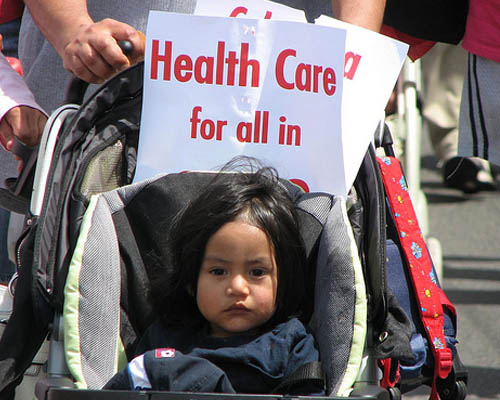
The call raised a serious red flag for undocumented immigrants’ capacity to apply for health insurance, even for their U.S.-born children. At the bottom of the Kynect application, there is a clause stating that Kynect may verify applicants’ information with the Social Security Administration and the Homeland Securities Administration (HSA). If Luis didn’t have a work permit, I explained to the DCBS agent/worker who answered my call, he and his wife would be hard-pressed to apply for insurance for their children. Joining databases between what is now Kynect and the HSA is a potential recipe for deportation. The agent simply suggested that Luis and Alma “get their papers straight” and become legal residents. If only it were that simple! Meanwhile, Miguel and José will need to pay the bills without the possibility of health coverage.
And herein lies the rub. One the one hand, the Affordable Care Act allows for access to healthcare for many more people, but it has also established links between applicants and government offices including the Homeland Security Administration (HSA). Given existing precedents across the U.S. of HSA officials from Immigration and Customs Enforcement (ICE) mining information even from local traffic courts to identify and detain undocumented immigrants for deportation, how many undocumented people will feel free to apply for insurance through state health exchanges — even if it is for legally documented minor children?
___________________________________________
Jesus came to give fullness of life to human beings. Through both his word and action, he shared the Good News that laws should only be honored insofar as they nurture and protect life.
___________________________________________
For undocumented immigrants like Miguel, José, Maribel, Luis, and Alma, healthcare is almost always out of reach. Adán is fortunate that Medicaid will cover his emergency-related expenses for up to two months, but after that, he’ll be in the same situation as most of the rest of his family. “Where do the sick people go right now?” Luis asks.
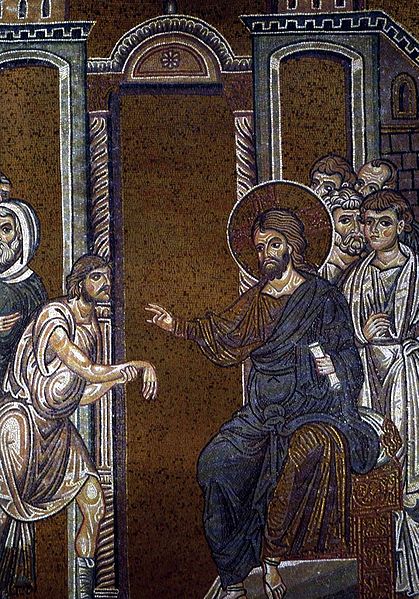
What are we to do with this as Christians? Health care is a universal right, and care for the immigrant and the most vulnerable is at the heart of God’s covenant with God’s people. The psalmist reminds us that “The Lord lifts up those who are weighed down…The Lord protects the foreigners among us. He cares for the orphans and widows.” (NLT, Psalm 146: 8b, 9). Many European Americans, like myself,remember our own history – the story of many of our ancestors coming as strangers to the United States of America: “You must not mistreat or oppress foreigners in any way. Remember, you yourselves were once foreigners in the land of Egypt.” (NLT, Exodus 22:21).
Jesus came to give fullness of life to human beings. Through both his word and action, he shared the Good News that laws should only be honored insofar as they nurture and protect life. For example, he encouraged his disciples to pick grain on a Sabbath day to fill their hungry stomachs. He also healed a man’s withered hand on the Sabbath, violating Jewish law but announcing, “The Law allows a person to do what is good on the Sabbath.” (Matthew 12:12b)
Undocumented brothers and sisters like Adán and his family are our neighbors; they are part of God’s family and are workers, students, and contributing members of our communities. God calls us to love our neighbors and to protect the foreigners and the vulnerable. My hope and prayer is that just immigration reform and health reform? will allow Adán and his family access to affordable healthcare.
AUTHOR BIOS: Rev. Elmer Zavala serves the Presbyterian Hispanic/Latino Ministry of Preston Highway, a ministry of Mid-Kentucky Presbytery. Elmer and Ellen are married and she serves alongside him in his ministry with undocumented immigrants. They are members of Beechmont Presbyterian Church in Louisville, KY.
Click here for the rest of this week’s articles.
Read more articles in this series.


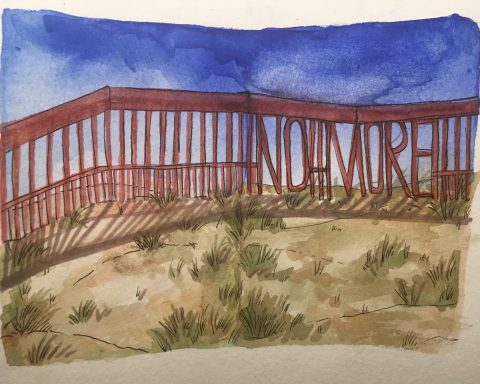
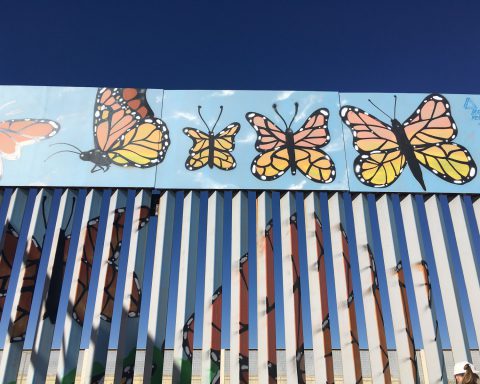
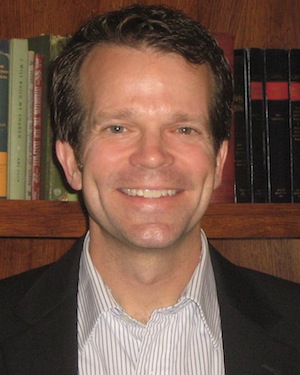
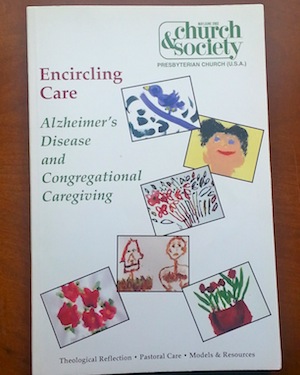
Unbound Social